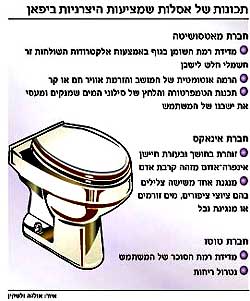Japan / Competition forces manufacturers to develop toilets with special capabilities
James Brooke, New York Times

Nara, Japan. Matsushita company engineers introduced a toilet seat in February, equipped with electrodes that send a weak electric current to the user's buttocks and measure the level of fat in his body. The engineers of "Inax", the rival company, were quick to respond. In April, Inax introduced a toilet that glows in the dark, detects human proximity with the help of an infrared sensor and plays sounds - including birds chirping, the sound of running water, wind chimes and a Japanese harp melody. The "toilet war", between toilet manufacturers competing for the consumer's pocket, has begun.
In May of this year, Matsushita introduced a $3,000 toilet, which welcomes the user by raising the seat and blowing hot or cold air depending on the weather. A month later, the "Toto" company launched the "Volio-2" toilet, which measures the user's sugar level using an automatic arm.
While Westerners' toilets only allow the user to decide whether to flush, Japanese toilets offer the user a multitude of options. Users of Matsushita toilets, for example, can program the temperature of the toilet and determine the degree of pressure of water jets that clean and massage the buttocks.
Water jets in toilets are common in half of Japanese homes. However, there are Japanese who see this phenomenon as a sign of the "softening" of the nation. They fear that the young people of Japan, who live on air-conditioned and equipped toilets, will become spoiled and, when necessary, will not be able to deal with the Chinese industrial workers or with the North Korean soldiers who still use "bullet shooting" services. Hideki Nishioka, a 90-year-old retired professor who heads the Japan Restroom Association, claims that new schools in Japan must install "at least two 'shooting ball' type toilet facilities."
However, the Japanese nation is known for its fondness for various technological accessories, and it seems that now it is the turn of the Japanese toilets to undergo an upgrade. The Toto company, for example, already markets toilets that neutralize odors. The "Inax" company sells ceramic tiles for bathrooms that absorb odors.
According to estimates, in the future Japanese toilets will be even more sophisticated. They will be equipped with chips and will greet the user with a personal message. In the near future, it will also be possible to program the toilets so that they can obey voice commands. However, it seems that the most popular toilets will be medical toilets connected to the Internet. "The toilet will become a home medical laboratory," said Hiroyuki Matsui, Matsushita's senior engineer. The medical toilets will conduct various tests on the user's body. They will send the results of the tests to the doctor via a cell phone that will connect to the network. In this way, doctors will be able to diagnose, for example, the physical condition of patients confined to their homes. "Within five years, this technology will be available for use," claimed Harry Trei, director of research at Matsushita.
However, human rights activists in Japan are already expressing concern about the next generation of toilets. According to them, the toilets will arbitrarily send an e-mail containing very personal information about the user's physical condition. Various parties, they say, will be able to monitor the information transmitted and know at all hours of the day who is constipated, who hasn't eaten their vegetables and who is drinking too much.
https://www.hayadan.org.il/BuildaGate4/general2/data_card.php?Cat=~~~342796606~~~30&SiteName=hayadan
